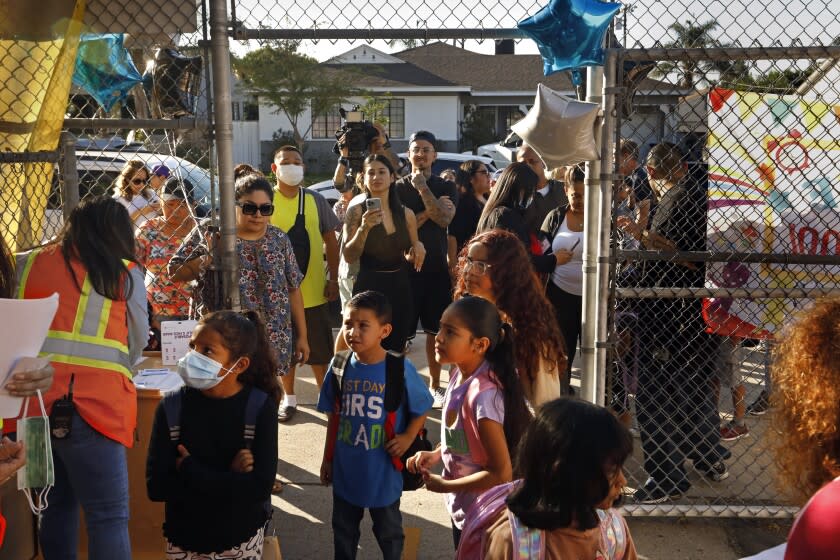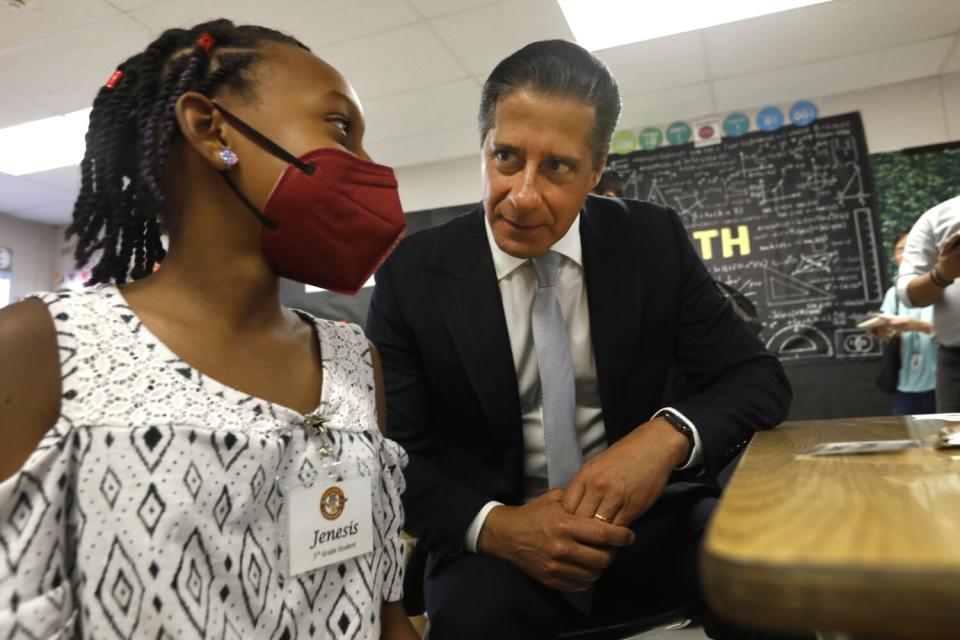L.A.'s back-to-school challenges: low test scores, scramble for teachers, missing students

Los Angeles school officials began the new school year Monday with a sense of urgency over the pending release of low and declining standardized test scores, a scramble to get the best professionals helping students and the ongoing search for an estimated 20,000 "missing" students.
Supt. Alberto Carvalho responded to these massive challenges by promising a "year of acceleration" in the nation's second-largest school system. Part of that initiative was undertaken in a public event last Friday as counselors and administrators, including Carvalho, worked the phones and hit the streets to identify students who have missed too much school, failed to reenroll or never enrolled in the first place.
"Obviously, we cannot teach the absent child," Carvalho said Monday at the end of the first day of classes. "That is why we have launched the iAttend initiative that began last week with our first day of recovery, a day that's going to be repeated for as long as we need it.
"We have a lot of lost kids in Los Angeles," he said.
Many of these students were not around to take last year's state standardized tests. But even for the students who mostly made it to class, the results are sobering, Carvalho said, referring to the state tests by their formal name, "Smarter Balanced."
"Soon enough, we'll be releasing Smarter Balanced information from the state of California, and I can assure you it's not going to be pretty," said Carvalho, who has seen the scores but has not yet been authorized by the state to release them. "It is going to reflect all the fears that we have felt — meaning significant declines in achievement performance, particularly in reading and mathematics, across the board, all grade levels."
And for that reason, he said, families and staff need to move past their fears about COVID-19 safety and prioritize student learning. COVID safety is being handled reasonably, he added, and monkeypox — the new attention-grabbing health crisis — presents no reasonable cause for concern in schools at this time.
Carvalho repeatedly pointed to bright spots on the first day: a higher attendance rate than last year's opening, only one instance of a class being moved because of a broken air conditioner and only 1.5% of buses running more than 15 minutes late.
More important, he said, all 400 classroom teacher vacancies had been filled by qualified credentialed educators who were pulled in from other non-classroom jobs. Meanwhile, about 500 new teachers are in the pipeline to become the permanent hires for these classrooms.
Carvalho also said he has ordered a hiring freeze for any positions not located on a school campus. The bureaucracy has unnecessary and costly duplication, he said.
"We are currently doing an assessment of staffing levels," Carvalho said. "I do believe, in some areas, we are overstaffed. In other areas, we are not. There is a distribution-of-talent problem — bigger than a scarcity-of-talent problem in our school system."
For the most part, parents and students interviewed throughout the day accepted Carvalho's characterization of a school system gradually getting back to normal and focusing on the critical mission of education.
"I'm excited for my son to learn," said Plummer Elementary parent Donovan Donaldson. "Just watching that gradual growth of him coming home and knowing more and knowing letters and numbers."
Collin, 5, had been nervous, but he'd already run off to play with a boy he met while waiting with his parents in the line for new kindergartners.
Karla Donaldson had originally been fearful about security after the mass shooting in May at an elementary school in Uvalde, Texas. "But then I saw that everything is closed off and they have everything organized."
Several parents wanted to know about the Daily Pass, last year's COVID-19 screening ritual, which required students to prove digitally that they were up to date on weekly coronavirus testing and parents to attest each day to the family's lack of illness. Any symptoms would trigger a stay at home that would probably last up to 10 days or longer.
The pass is no longer required, Principal Ibia Gomez explained in English and Spanish. Weekly testing has also been discontinued.
Families and employees, however, have been encouraged to take optional tests. If they test positive, they are then required to report the results and remain at home. According to Carvalho, the tally was 1,055 students reporting a positive test out of about 437,000 and 350 staff members out of about 74,000, including 24,000 teachers.
At one point, Carvalho hopped on a school bus, taking the opportunity to alert fifth-grader Juliette Godoy that all buses have been equipped with Wi-Fi. Her bus-stop-heavy commute from Sylmar to the magnet at Vena Avenue Elementary in Arleta takes more than a hour. Juliette was grateful for the news and took the opportunity to tell the schools chief that the district's orange chicken sometimes did not seem fully cooked.

In a fifth-grade class at Vena, the superintendent took part in an icebreaker with three students. Their verdict: ice cream was among the things they loved; bugs — including "arachnids," as one student specified — were among the things they hated.
Eleven out of 18 students opted to wear masks.
At Porter Ranch in the north Valley, which serves a more affluent community, fewer than half the students appeared to be wearing masks.
"It's a big change coming off of two years of COVID," said parent Nicole Pifko. "Everybody's excited. I definitely feel an increase in energy among parents and students. And it's really amazing to be able to see everybody's face also, without the masks."
Carvalho also visited an early education program in Marina del Rey. The school system is hoping to bring in thousands of new students — and partly reverse sharply declining enrollment — through expanded transitional kindergarten and early education programs, which have benefited from increased state funding.
The recently hired superintendent — who has been on the job for six months — also stopped at Marlton School, which specializes in educating students who are deaf and hard of hearing. He asked new Principal Danielle Frierson what she needed, and she answered: repairs to an audiology lab for student hearing tests.
Carvalho's day ended among high-achieving students at King/Drew Magnet High School of Medicine and Science.
Haley Henderson, an 11th-grader, said she still feels "some sadness" over a ninth grade spent at home in remote learning because of the pandemic. "But I'm really excited to be here, so I think that fills that void."
Times staff writer Paloma Esquivel contributed to this report.
This story originally appeared in Los Angeles Times.

